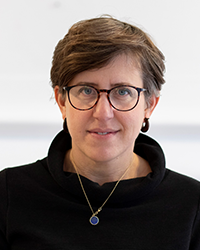Sarah Wolferstan, Project Manager at UCL’s Centre for Applied Archaeology, shares her experience of working at the National Trust as part of UCL’s strategic partnership.
Assessing how archaeology affects volunteers’ wellbeing
“The opportunity came up to apply for a research secondment with the National Trust as part of their five-year strategic partnership with UCL. I put myself forward for the project relating to ‘participatory archaeology’, looking at the impact of archaeology projects on volunteers’ wellbeing.
National Trust archaeologists are increasingly called on to evaluate the wellbeing of participants, to improve their practice. And from our side, we saw the secondment as a way of bridging academic and commercial practice and using our expertise to create real-world impact.
The project complemented my background as an archaeologist in both an archaeology company and a leading university department. My colleagues at Archaeology South East are also increasingly required to evidence the public benefit of archaeology. So I was keen to translate lessons learnt to them, too.
How the secondment worked
In terms of practical organisation, I worked part time with the Trust, two to three days a week, over three months.
It was a very different way of working for us, doing research in this collaborative way, but we gained enormously from it.
Researchers from both organisations worked together on all aspects. Although most work was authored by UCL, the National Trust collated documentation and led on the consultation. For my part, I gained valuable insight into policy issues and how the sector translates those into practice.
Fact-finding and developing a new tool
Once a field archaeologist, always a field archaeologist. So I enjoyed the site visit to Wicken Fen in Norfolk the most: walking alongside volunteers and staff in a large, ploughed field on a sunny but bitterly cold November day, looking for finds. As soon you find an artefact, you’re immediately transported back thousands of years to the moment someone dropped it. A long-lost landscape then becomes easier to understand.
The fact-finding consultation phase was also very interesting. Grounding the literature in reality, we could understand the day-to-day challenges the Trust archaeologists and their partners face in evaluating wellbeing.
Our findings suggested that wellbeing is an excellent framework for evaluating participation in archaeology. But, up to now, there’s been no tool to monitor it. So we spent the last month developing one specific to National Trust archaeology volunteers. Once refined, this will improve the impact of the Trust’s work with communities, as well as highlighting the value of this work internally. It can also be used as a model for other organisations looking to understand and improve their social impact.
Support from UCL Innovation & Enterprise
UCL’s Innovation & Enterprise team helped us to kick off the project, checked in half-way through and put us in touch with other UCL secondees.
They’ve been very supportive in helping us disseminate the project’s results and responsive to requests on details of the application and financing.
The benefits of secondments
Our raised profile from the project has opened doors to new opportunities. We’ve been asked to join a national working group coordinated by the Council for British Archaeology. I’ll be incorporating this work into my guest lectures for the Institute of Archaeology’s Cultural Heritage MA too.
The short timeframe may put some academics off applying. So I’d encourage them to see the secondment as an opportunity to create something entirely different to a traditional research output.
It was much more flexible than other short projects I’ve been involved in, and this allowed us to adjust the scope during the project’s lifetime. In this sense, it was a more entrepreneurial, innovative way of working.
If you’re part of a team with a wide remit, this kind of placement will give you a valuable opportunity to increase your impact, and to work in partnership with the sector.”
Links
- UCL’s partnership with the National Trust: update and how to get involved
- UCL and the National Trust partner to promote heritage science, conservation and cultural value
- UCL academic spotlight: Professor Rodney Harrison on UCL’s new partnership with the National Trust
- National Trust
- UCL Centre for Applied Archaeology
Image
Image of Sarah Wolferstan at UCL & National Trust Gala event: copyright Thomas Jenkins.
 Close
Close


